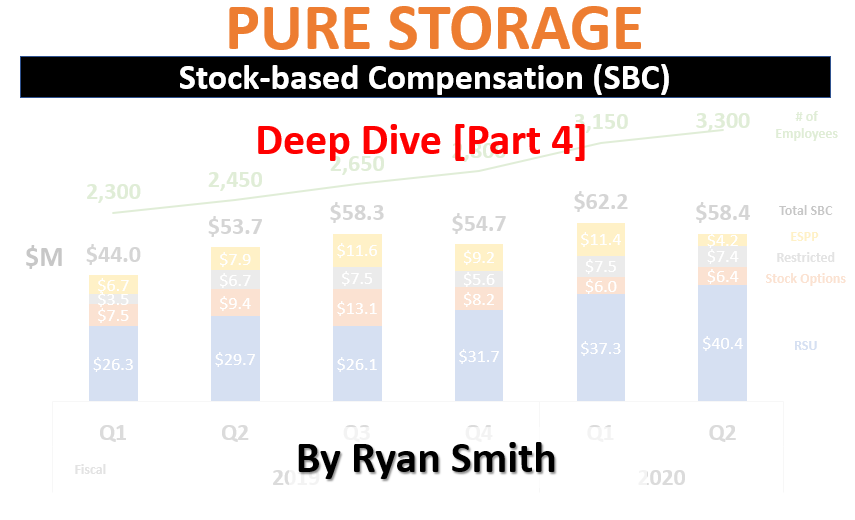In my first part of the Pure Storage Deep Dive, I illustrated how stock-based compensation (SBC) at Pure Storage (PSTG) is large enough to not ignore when looking at the fundamentals of the company. Let’s compare Pure to its peers to see how unique Pure Storage is in its SBC plan to employees.
Please read my entire disclosure at the bottom of this post. A quick version: I work for Hitachi Vantara, although this post has absolutely nothing to do with my employment there.
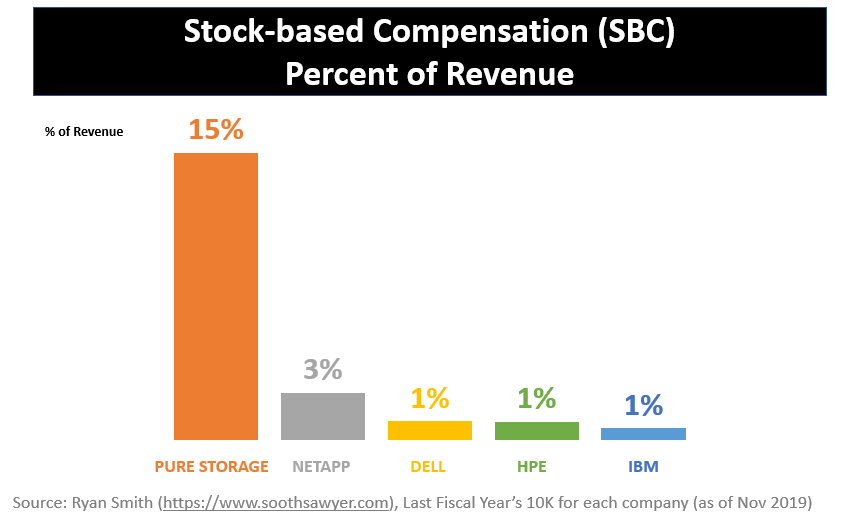
Interesting.. So, when looking at SBC as a percent of revenue, Pure Storage is outpacing it’s peers by 5x! Note: Out of all of Pure Storage’s peers, I prefer using Netapp for the best benchmark because their overall portfolio is the most similar (whereas the others have a wider portfolio of products).
More appropriately, let’s compare SBC to operational expenses. Note that I only included normal operational expenses like SG&A, R&D and not things like miscellaneous charges, restructuring, etc.; This resulted in no significant difference, although it is worth mentioning.
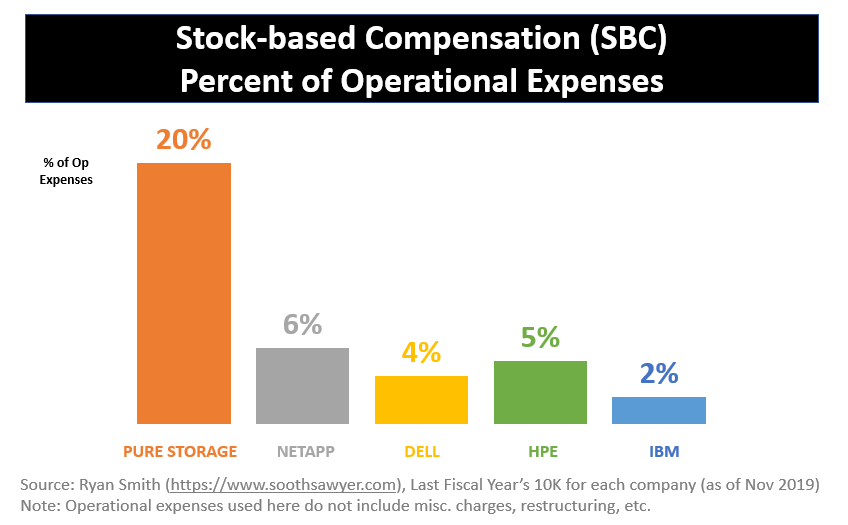
Wow, 20% of all of Pure Storage’s operational expenses are due to stock-based compensation which is omitted from all non-GAAP reporting (note that omitting SBC from non-GAAP reporting is actually pretty standard; what is atypical in this industry is the high level of which SBC contributes to the overall operational expenses).
It looks like the norm in this space for stock-based compensation as a percent of operational expenses is around 5-6%. The difference between Pure Storage and its competitors is quite interesting and I’d be curious to know the reasoning behind this.. Is this level of SBC common in other industries? Is this common in <10 year-old companies? Is Pure borrowing a concept from another industry? I’d love to hear your thoughts.
So, because it is quite big, let’s break down exactly what makes up Pure Storage’s stock-based compensation.
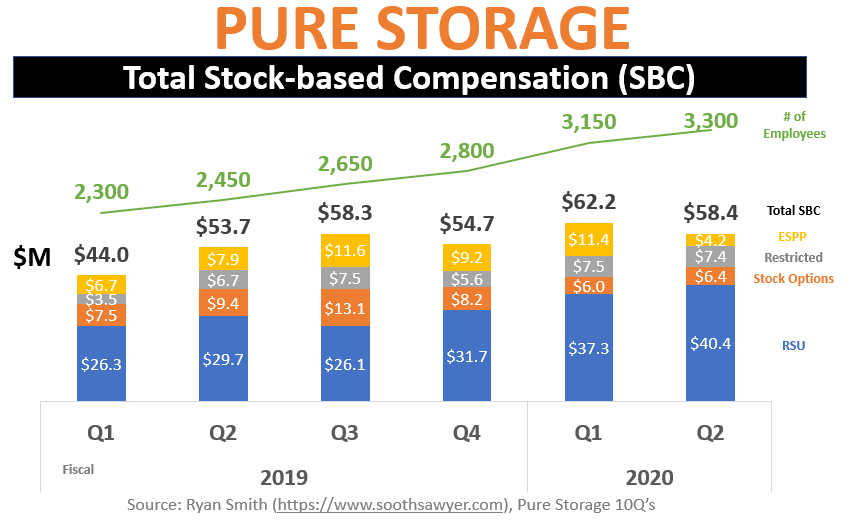
I poured through Pure Storage’s quarterly statements and broke down their stock-based compensation the best I could. The stock options/RSU mix may be different from actuals as this was not 100% clear from their financials. I modeled the mix based on my interpretation of information from their statements; But again, the mix may be off between those two, but the subtotal between the two, and the overall totals, should be spot on.
Let’s now break it down by employee to see if we can spot some trends.
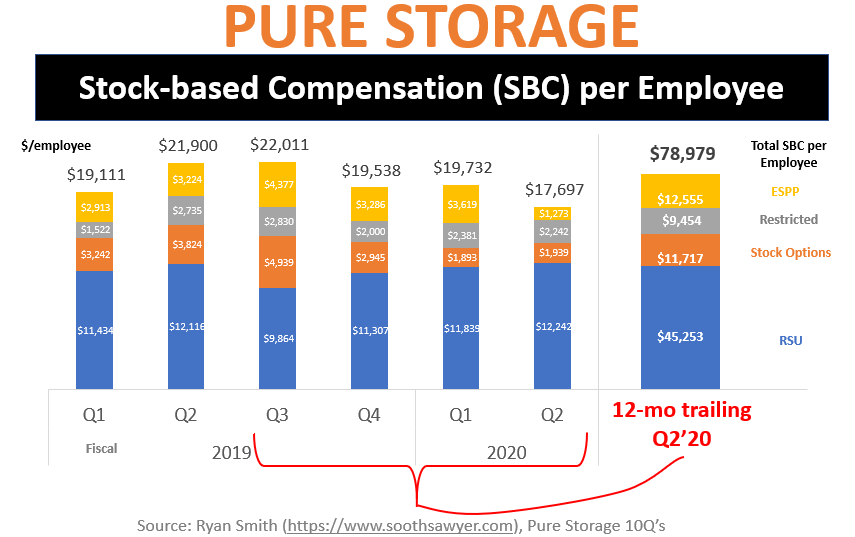
On average, it looks like each Pure Storage employee is getting around $79K in stock-based compensation every year. Note that this includes ESPP (Employee Stock Purchase Program) which is optional and usually isn’t considered as part of the total compensation to the employee. If you omit that, each employee is getting roughly $66K in stock-based compensation + $13K in ESPP.
Another thing to note is that this is the perspective of the employer, which means this will include Pure Storage’s portion of income tax (e.g., Social Security [6.2%], Medicare [1.45%], Medicare Surcharge [0.9%]) so you would need to back those out if you want to know what the employee sees.
I do notice that the overall SBC has declined over the last four quarters but this might be due to a falling stock price rather than a deliberate attempt to lower SBC towards the industry average.
I will be using the average ESPP figure here in my next post that will look at Sales & Marketing compensation in more detail so we can understand how their salespeople are compensated.
Well, that’s it for this post.
A not-so quick disclosure: I work for Hitachi Vantara (a competitor of Pure Storage). However, this fact has nothing to do with this post because I have not been asked by anyone or any organization to analyze or publish my findings here with you. Others watch TV at night.. I watch data. And when I share my thoughts, they have no intent (so please don’t make up a story as to the intent) other than satisfying my urge to share ideas/thoughts..that’s it. I must also state that my views here in no way reflect that of my employer. Additionally, do not use any of this information to make financial decisions; treat this as for entertainment purposes only. The intent here is to see what kind of cool things easily available data can tell us, and this month it happens to be Pure’s financials. Additionally, Pure is an amazing company, just like all companies, and I wish them the best in their journey.

I have been around IT since I was in high school (running a customized BBS, and hacking) and am not the typical person that finds one area of interest at work; I have designed databases, automated IT processes, written code at the driver level and all the way up to the GUI level, ran an international software engineering team, started an e-commerce business that generated over $1M, ran a $5B product marketing team for one of the largest semiconductor players in the world, traveled as a sales engineer for the largest storage OEM in the world, researched and developed strategy for one of the top 5 enterprise storage providers, and traveled around the world helping various companies make investment decisions in startups. I also am extremely passionate about uncovering insights from any data set. I just like to have fun by making a notable difference, influencing others, and to work with smart people.

